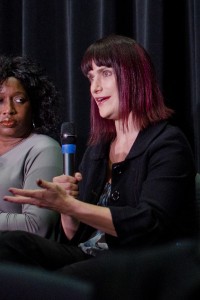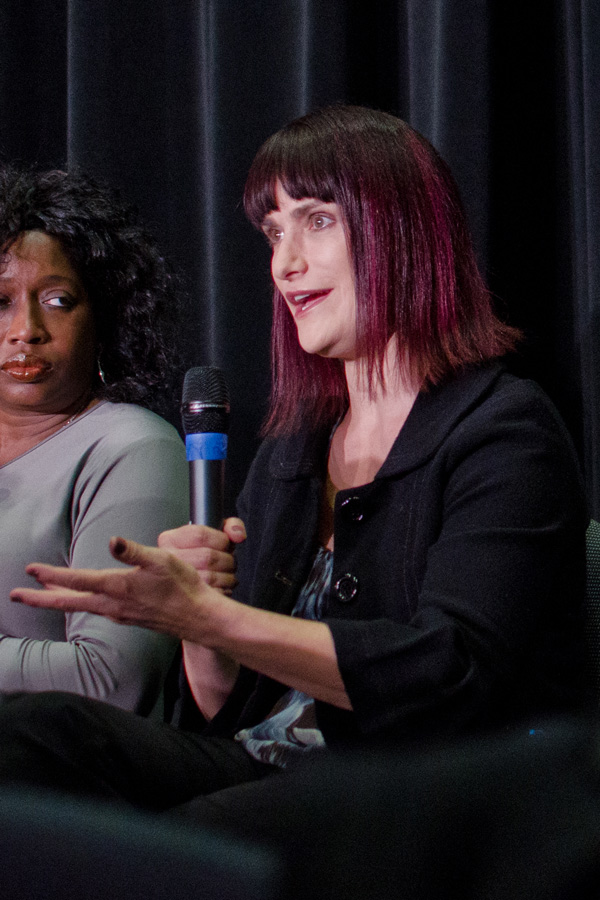Panelists analyze the role of women in TV
On Thursday, Annenberg Innovation Lab hosted “Geek Speaks: The Women Who Make Television.” Focusing on the development of arts and technology, the event recognized women who have played pivotal roles within the television industry.

It’s all geek to me · Alexa Junge, a producer of the former hit show Friends, spoke to students on how her past experience has influenced her. – Kirstin Louie | Daily Trojan
“The goal of the Geek Speaks lecture series is to bring popular artists to campus to engage in thoughtful conversations that we think might be relevant to geeks here at USC,” said Provost’s Professor of Communication Journalism and Cinematic Arts Henry Jenkins.
The night featured two panels. The first focused on the creative process of the industry. Women from iconic television shows such as Friends, Fringe and The Vampire Diaries discussed how they began their careers, ranging from how they interacted and collaborated with mentors and employees to how they believed the media and audience can change the way in which their work has been produced and viewed. Erin Reilly, creative director of the Annenberg Innovation Lab, moderated the panels.
The first panel began by speaking about what television meant for them growing up in their childhood households. Julie Plec, co-creator and executive producer of The Vampire Diaries, discussed her love for soap operas as a child.
Melanie Chilek, on the other hand, discussed her experience working in television production and business within the industry.
“Reality television has its roots in journalism, and to tell stories in journalism, you ask a lot of questions,” Chilek said. “I was an avid and voracious reader and very curious. This propelled me for my career in the reality side and business side.”
Felicia Henderson, writer and co-producer of Fringe and Gossip Girl, started her career in her living room watching sitcoms as a child before her bedtime.
“Eight o’clock sitcoms are my favorite things in the world,” Henderson said.
Alexa Junge, producer of Friends, felt ’70s sitcoms shaped her understanding of human relationships. She began her career in theater, desiring to be a playwright until she started working at Nickelodeon.
“Many of the skills that I had were of value [at Nickelodeon],” Junge said. “The collaboration was so evident, because as a playwright the writing is so concrete.”
The panel also agreed over what they believed was the main barrier for female directors and producers. Though a common assumption would be that the main issues are pregnancy and family, the actual reasons appear to be gender and finance.
Asha Anderson, a sophomore majoring in political science, discussed how going to this panel would help her prepare to battle these problems when she enters the industry.
“I’m an aspiring writer and director for television and although I’m not in the film school, I thought it would be interesting to see how my gender, [which is] highly underrepresented in this industry, are treated in their careers,“ Anderson said.
The second panel focused on creative products. It dove into the harder issues that have arisen in past years — whether it’s in the content of their material or the issues their shows explore. The panel included women from prominent television shows such as Sex and the City and My So-Called Life and was moderated by Francesca Marie Smith, a member of Annenberg Lab.
Meg DeLoatch, co-executive producer of Disney Channel’s Austin & Ally, cites herself as a “TV baby.” She came to Los Angeles as an actress but realized a career as a writer would be more stable.
Women such as DeLoatch serve as inspiration for students such as Sarah Ortiz, a junior majoring in critical studies.
“I hear all this stuff about how difficult this career is for women, but I’ve gone to several of these panels, and this one was particularly interesting because I could hear the paths of these women,” Ortiz said.
Robin Schiff, executive producer of Romy and Michele’s High School Reunion, loved television as a child, saying she even picked her childhood friends based on their love for television.
“TV is the medium. I don’t hear anyone having long conversations about movies, but I do hear them for House of Cards and Game of Thrones,” Schiff said.

